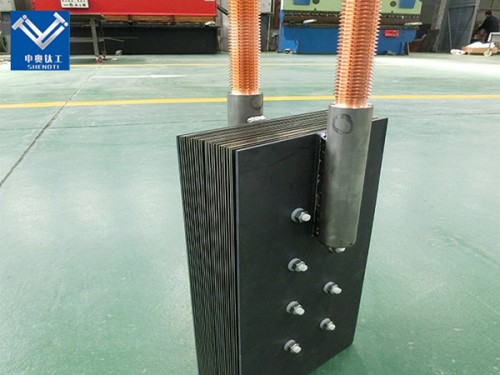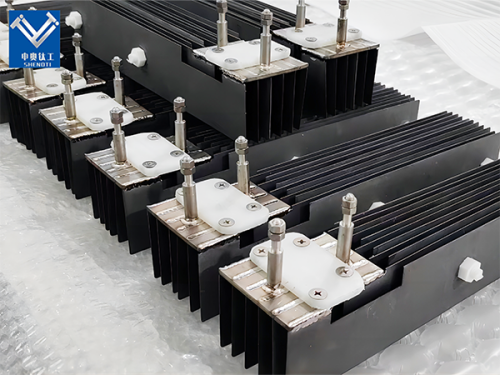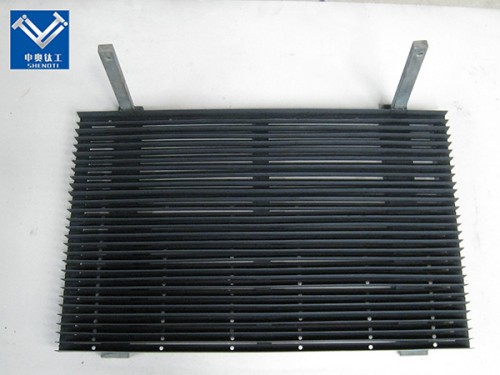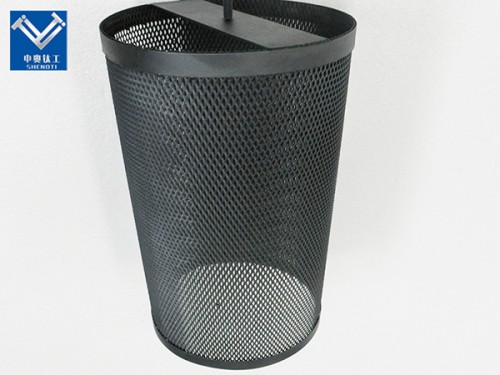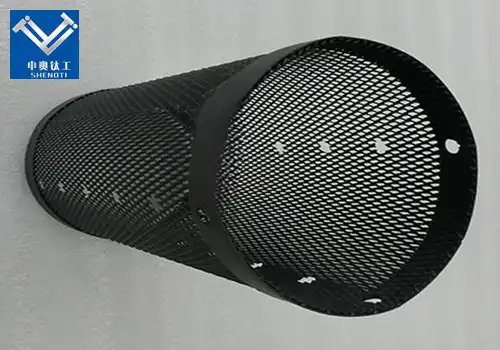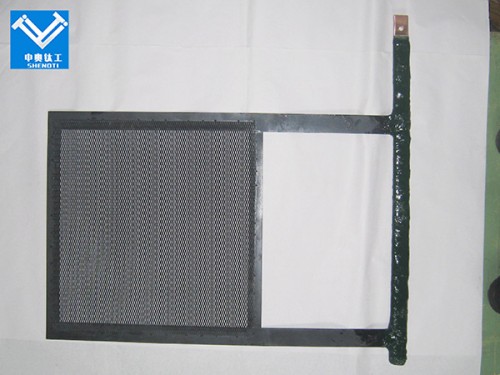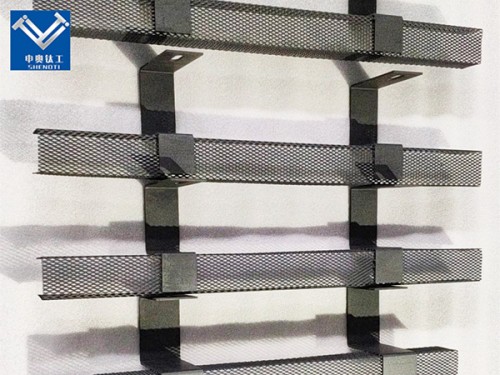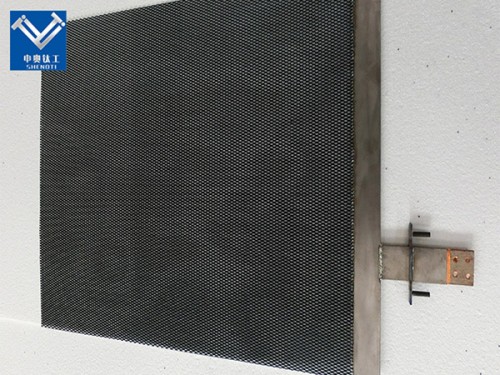
In which industries are customized titanium electrodes mainly used?
2025-06-09 16:01:46
In which industries are customized titanium electrodes mainly used?
Titanium electrodes, especially those customized and coated with ruthenium (often alloyed with iridium), have carved out a crucial niche in diverse high‑performance industrial applications.
1. What makes ruthenium-coated titanium electrodes ideal for chlorine and wastewater treatment?
Ruthenium‑coated titanium electrodes—commonly referred to as mixed metal oxide (MMO) or dimensionally stable anodes (DSAs)—are widely recognized as excellent catalysts for chlorine evolution and electrochemical wastewater oxidation
Low chlorine over‑potential and high durability
The RuO₂ coating dramatically lowers the voltage needed to evolve chlorine from saline solutions, compared to cheaper carbon or lead anodes. Plus, the titanium base offers corrosion resistance and mechanical durability. This combination makes the electrodes highly energy‑efficient and long‑lasting
Superior chemical stability
Titanium resists corrosion in chloride-rich, acidic environments. The ruthenium (and often iridium) oxide coatings are catalytically active yet stable in harsh conditions—maintaining performance over years
Applications in chlor‑alkali and sodium hypochlorite production
In chlor‑alkali plants, brine electrolysis uses these DSAs to generate chlorine gas, hydrogen, and sodium hydroxide. Their low over‑potential reduces power consumption—a key operational cost driver
Sodium hypochlorite generators (on‑site bleach systems for water treatment or pools) rely on the stability and efficiency of ruthenium‑coated titanium meshes
Electrochemical wastewater treatment and disinfection
For degrading refractory organics in industrial effluents (e.g., dyes, pharmaceuticals), these anodes facilitate electro‑oxidation and chlorine‑based disinfection directly in situ
Swimming pool & cooling‑tower disinfection
Their long life and effective chlorine production make them ideal for pool sanitation and cooling‑water circuits, requiring minimal maintenance and ensuring consistent microbial control .
Ruthenium-coated titanium DSAs excel due to catalyst efficiency, durability, and low operating costs—making them industry‑standard for chlorine production and electrochemical decontamination.
2. How are ruthenium‑iridium coated titanium electrodes used in electroplating and chlor‑alkali processes?
This question explores their use in metal finishing and large-scale products, bridging both electroplating and bulk chemical production.
A. Electroplating applications
In electroplating (e.g., copper, nickel, chromium, zinc), anodes must deliver uniform current and resist acidic, chloride‑rich electrolytes. Ru‑Ir titanium DSAs offer:
Exceptional catalytic efficiency
Ruthenium‑oxide surfaces significantly enhance current distribution and deposition consistency
Long lifespan in harsh baths
Iridium inclusion improves corrosion resistance, especially in oxidizing acid environments
Tailored geometries
DSAs come in shapes like mesh baskets, plates, strips, or rods—custom‑fabricated to fit plating tanks and specific requirements
Thus, customized electrodes bring reliability and performance enhancements to high-precision metal finishing.
B. Chlor‑alkali processes
Chlor‑alkali requires efficient, durable electrodes for brine electrolysis. Ru‑Ir DSAs help by:
Reducing energy consumption
Their catalytic coatings lower cell voltage, decreasing electrolysis power usage—which is economically significant
Minimizing downtime
They resist corrosion, fouling, and chlorine-induced wear, translating into longer life and less maintenance .
Flexible design
Customized meshes, plates, or tubular electrodes ensure compatibility with diverse cell designs .
These attributes make ruthenium‑iridium titanium electrodes indispensable for large-scale chlorine, caustic soda, and hydrogen manufacturing.
3. Can ruthenium‑coated titanium electrodes enhance saltwater desalination and metal recovery?
Yes—these DSAs are increasingly used in desalination, electrodialysis, and metals electrowinning, broadening their industrial footprint.
A. Saltwater desalination (electrodialysis)
In electrodialysis desalination, both anode and cathode are critical. Ru‑Ir coated titanium meshes:
Maintain stable anolyte potential over long operations.
Resist fouling and salt deposition.
Are dimensionally stable, ensuring durable operation under variable pressures
These characteristics make them ideal for brackish water desalination in industrial or municipal settings.
B. Metal electrowinning and recovery
Industries reclaim copper, zinc, nickel by electroplating them from aqueous solutions. Ru‑Ir DSAs help by:
Ensuring uniform current distribution—yielding purer deposits.
Withstanding acidic, oxidative electrolytes (e.g., sulfuric acid).
Reducing power consumption by lowering over‑potential .
Electrolytically recovered metals benefit from efficiency gains and fewer impurities—crucial for market-grade recovery.
4. In which industries are customized titanium electrodes mainly used?
Pulling together the above, here are the primary sectors and how they leverage customized titanium electrodes:
Chemical and chlor‑alkali industries
Brine electrolysis for chlorine, caustic soda, hydrogen.
Production of sodium hypochlorite, chlorates, chlorine dioxide.
Cooling tower sanitation with onsite chemical generation.
Water treatment and desalination
Industrial wastewater oxidation and disinfection.
Municipal effluent treatment and pathogen control.
Electrodialysis of brackish water and saltwater desalination.
Metallurgical and electrochemical industries
Metal recovery and electrowinning.
Industrial electroplating (copper, nickel, chromium).
Electrochemical organic syntheses.
Marine, cathodic protection, and more
Cathodic protection of marine structures using sacrificial titanium anodes.
Marine environment electrolysis (e.g., underwater cathodic systems).
Cooling water treatment and cleaning.
Advanced niche uses
pH sensors and analytical electrodes (RuO₂/IrO₂ sensors measure pH 2–12, stable with ~4–13 s response time)
Special organic synthesis
The customization—shape, coating thickness, material ratio, substrate prep—is essential to performance in each scenario.
5. How are ruthenium coatings engineered on titanium electrodes for optimal use?
Customized electrodes meet unique demands via precise manufacturing:
A. Surface preparation
Using high-grade titanium (ASTM B265–Gr1 or Gr2), surfaces are mechanically or chemically cleaned and roughened to enhance coating adhesion
B. Coating application
Coatings include RuO₂, IrO₂, or mixed Ru‑Ir oxides, and sometimes Sn or Co—applied via spraying, brushing, thermal decomposition, or electrodeposition
C. Thermal treatments
Post-coating annealing converts precursors into catalytic oxides; multiple cycles ensure controlled thickness and uniformity .
D. Quality checks
Final inspection confirms coating consistency, catalytic performance, and stability under expected current loads.
Such detailed fabrication ensures each electrode fulfills its specific industrial purpose.
6. Why are ruthenium‑iridium mixed coatings preferred over pure ruthenium?
Enhanced stability: IrO₂ resists oxidative degradation, extending electrode life
Optimized catalytic performance: Ru provides high activity; Ir adds longevity—together they offer the best of both
Operational resilience: Mixed coatings function across wide pH ranges and temperatures with low over‑potential
7. What are real-world examples of custom titanium electrode use?
Chlor‑alkali plant meshes
Plate or mesh DSAs used in brine electrolysis, producing chlorine and caustic soda efficiently.
Wastewater treatment reactors
Stainless racks of Ru‑Ir meshes in hospitals, dye factories, or aquaculture setups—removing organic pollutants.
Swimmings pools and cooling towers
Compact Ru‑Ir titanium rods/baskets generate on‑site hypochlorite for sanitation.
Electrodialysis stacks
Custom‑shaped DSAs in desalination plants.
Metal finishing baths
Strip or basket anodes in copper plating and chromium electroplating for automotive and electronics industries.
Main industries: Chlor‑alkali chemicals, water/wastewater treatment, electroplating, electrowinning, desalination, marine cathodic protection, analytical sensors.
Key features: Custom shapes, Ru/Ir coatings, titanium backbone—delivering durability, energy efficiency, and catalytic activity.
Why customization matters: Unique industry challenges—chemistry, current density, mechanical fit—demand bespoke designs.
Contact Us
Baoji City Shenao Metal Materials Co., Ltd. specializes in the R&D, manufacture, and customization of high-performance titanium electrodes—including ruthenium‑coated, ruthenium‑iridium coated, and platinum-coated variants. Whether you need mesh, plate, rod, wire, basket, or custom geometry, we design and produce electrodes to your operational specifications.
Contact Us:
Baoji City Shenao Metal Materials Co., Ltd.
Email: zh@baojiti.com.cn
YOU MAY LIKE











